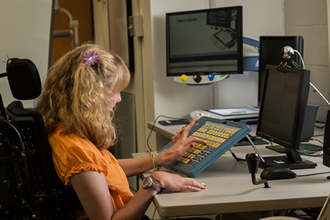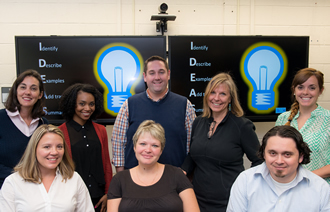Contributions
Contributions
The Education of GMU students is one of the five thrust areas of the KIHd. Many of the sponsored projects over the years have been training grants sponsored by the federal or state government. Hundreds of master's and doctoral graduate students have received tuition support and/or graduate assistantships to study at GMU. Students have come from many other states to study in programs at GMU because of such support. Additionally, private support has been provided for students through projects such as the UTEEM program. Other contributions come from the development and implementation of training programs that are revenue driven, but which would not otherwise be offered at GMU. Such programs include the SELF program and the Instructional Technology certificate programs, where scarce state-supported faculty resources prohibit offering adequate coursework to meet market demands. The KIHd also provides support to students with research and development grants, including graduate assistantship and tuition support to enable doctoral and master's students to work with faculty engaged in development in their respective fields. Wages and work study support is also available to students to support the programs and activities of the center. Finally, the KIHd is offering programs that benefit a broader student constituency including students (as well as faculty and staff) with disabilities across the University through access to trained personnel and equipment in our assistive technology lab.
Research and scholarly activity opportunities are enhanced through the projects of the KIHd. In addition to scholarly research completed via externally funded projects, the KIHd provides opportunities for doctoral and master's students to work with faculty on research projects, including dissertations and master's theses. Faculty associated with the KIHd have produced numerous scholarly publications and presentations and are nationally and internationally recognized. Additionally, the KIHd supports the development and production of instructional materials and software that are utilized nationally.
External service and outreach has been a major focus of the KIHd. The KIHd has developed collaborative linkages with faculty and staff within numerous GMU academic and administrative programs, focusing on securing external funding and providing services within the GMU community, regionally, across the state, nationally, and internationally.
Regionally, the KIHd works in the metropolitan D.C. area and northern and northwestern Virginia. The KIHd has provided services to regional schools, agencies, companies, non-profit organizations, and other advisory groups. The T/TAC and VATS projects alone are prominent in 27 counties with annual services to approximately 5,000-7,000 individuals, to include adults and children with disabilities and their families, service providers, students, and employers. Services to families of children with disabilities are also furnished on a fee for service basis (scholarships are also available) through the CompuWrite, CompuPlay, and Breakthrough programs that annually provide services to approximately 250 children with disabilities and simultaneously provide training opportunities for students in the GSE. Working with the National Cristina Foundation, the KIHd has distributed recycled computers for ten years to individuals with disabilities and to persons who are economically disadvantaged. Additionally, the KIHd has established national and international linkages related to these externally funded projects through collaboration with professional organizations, non-profit and for profit corporations, and various federal, state, and local governmental agencies.
The parent school, the School of Education, utilizes the resources of the KIHd to enhance its programs by implementing models such as SELF that provides outreach to the GSE's constituencies. The KIHd incorporates an extensive lending library of books and curricular material and an assistive and instructional technology lab that are used by students and faculty in the GSE programs. The KIHd also provides an infrastructure that provides opportunities for faculty to submit and manage external grants and contracts and to collaborate on the development of new programs and initiatives within the GSE. Personnel resources of the KIHd also benefit the GSE by providing access to a pool of highly qualified administrative and adjunct faculty that teach in the GSE's degree programs and who, unlike other adjuncts, are full time at GMU and have enhanced availability to students and other faculty. The faculty and staff of the KIHd are also active participants in the operations of the GSE, participating on committees, engaging in professional development, and providing ad hoc resources such as graphic design, instructional support, and other short term but needed assistance to the GSE. The revenues generated by the KCHd are also used to assist and support other GSE initiatives and programs.





